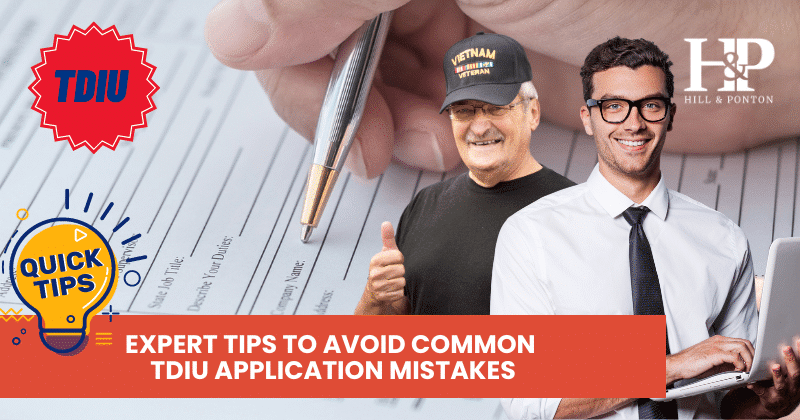If you have worked with the VA long enough, you have probably come to realize that you and the VA often do not see eye-to-eye. Certainly, this difference of opinion is highlighted no better than by one of the most contentious issues: unemployability. We see this all the time. The realities of your service-connected disabilities impacting your ability to work are lost on the VA. Fortunately, there is a way to support your Individual Unemployability case, and this is by vocational assessments.
Why the VA has trouble with IU cases
Before we go into vocational assessments, let us first examine why the VA has trouble with Individual Unemployability (IU). The structure of the VA’s rating schedule lends to this issue. The rating schedule is built around each individual disability rendering the veteran impaired in some form or fashion. Therefore, the VA is accustomed to looking at disabilities as individual puzzle pieces, rather than how the puzzle pieces fit together as a whole. Without a doubt, the rating system is built to benefit the veteran. Unlike the Social Security system, which determines whether you are completely disabled or not, the VA system enables the veteran to obtain compensation even if he/she is not completely disabled. It also provides them a way of increasing their compensation levels, which Social Security does not allow.
The problem is that, when you file a claim for IU, the VA tends to look at each individual disability, and whether or not that individual disability prevents you from working. To compound the problem, the C&P examiners, when asked to render an opinion on IU, do exactly the same thing. The end result is a very high denial rate for IU. The VA is not supposed to evaluate IU in this fashion, nor would it make any sense to do it this way; but, it still happens.
The other problem lies in the lack of expertise and experience in the vocational field on the part of those who are rendering opinions and making decisions. There is no one in the VA system—medical or adjudicatory—who is a qualified vocational rehabilitation counselor and whose sole role in the VA is to handle IU cases. Such a position does not exist. Therefore, the adjudicators rely on the C&P examiners for an opinion on whether or not the individual can work due to his or her service connected disabilities. Such individuals are not equipped with the knowledge base or experience in workplace job placement needed to make a well-rounded, practical assessment of a veteran’s ability to obtain or maintain substantially gainful employment in the current job market—which, as anyone in the workforce can attest, is fast-paced, high-stress, and often physically and mentally draining.
In many cases, the best way to combat this problem is to adopt one of Social Security’s methods: using a vocational expert. In Social Security cases, the vocational expert reviews the claimant’s file and makes a determination on whether or not the claimant can obtain or maintain employment in the current market with his/her transferable skill set.
In VA cases, we can use vocational experts in much the same way. Vocational experts are not required to testify in court before the VA, as in Social Security cases. Rather, they review the veteran’s file and evaluate the veteran’s ability to work, based on physical or mental limitations, transferable skill set, and the availability of jobs in the current market that match the veteran’s skills and need for accommodations. The vocational expert then provides a vocational assessment report, which is submitted to the VA for consideration.
What the vocational expert considers in the report
When a vocational expert is reviewing a case, the expert will look at the following:
- Prior education;
- Past work experience: how the past work experience translates into today’s job market, especially related to basic technical skills (such as familiarity with computers, printers, word processing programs), and ability to pick up the necessary skills efficiently;
Example: a long-time truck driver might have difficulty learning how to use Word or Excel
- The veteran’s current service-connected disabilities and the limitations involved;
Example: a veteran with a knee and back condition might not be able to sit for extended periods, or lift a certain weight, or might take longer to walk from one location to another
- The effect of pain & medication on ability to concentrate, focus, attend to verbal and written instructions, complete tasks in a timely and efficient manner;
- The veteran’s ability to communicate with and respond appropriately to managers and supervisors, and get along with co-workers; or communicate appropriately with clients;
- The veteran’s ability to adapt to stressful situations
- Any accommodations which the disabilities might require.
The vocational expert takes all the above factors into consideration and then evaluates the veteran’s ability to function in a certain workplace environment. For purposes of vocational evaluations, the Bureau of Labor Statistics compiled a Dictionary of Occupational Titles which contains most job types. They are categorized by general educational development (GED), skill level, the strength rating, the specific vocational preparation (VSP), and the guide for occupations exploration (GOE). The expert takes the veteran’s past education and work history, and assigns a rating from each of the above categories to the jobs that the veteran has performed. At that point, the expert can assess what skills transfer from the past jobs to any future jobs. For example, if a veteran previously worked as an engineer, he might be able to transfer certain skills to a desk job. On the other hand, a veteran who worked as a mason for years would not have the skills to transfer to an office job.
Finally, the expert will evaluate the veteran’s service-connected disabilities in light of his or her transferable skills, if any. The expert may find that the veteran’s disabilities preclude the ability to work, in spite of transferable skills, however impressive they might be. The expert will provide a discussion of the findings of the evaluation, and give an opinion on whether or not the veteran is able to obtain and maintain substantially gainful employment on a regular and consistent basis.
In summary, a vocational expert’s report will typically include:
- A review of the veteran’s medical record
- Identification of the service-connected conditions
- A break-down of the veteran’s past work experience
- An evaluation of transferable skills
- A vocational discussion
While it seems obvious to you that you cannot work due to your service-connected disabilities, the VA does not always see it that way. Obtaining a vocational expert’s report can help point out the obvious to the VA, and therefore improve your chances of being awarded individual unemployability.



